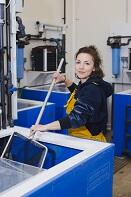
Seven winners of the L'Oréal-Unesco 2024 Young Talent Award
Seven doctoral and post-doctoral candidates from Sorbonne University have been awarded the L'Oréal-Unesco Young Talent Prize 2024 for Women in Science. The prize spotlights brilliant young female researchers who are dedicated to solving today's major scientific challenges, in the environment, medicine or technology.
© L'Oréal Foundation
A prize for women who achieve scientific excellence
Since its creation in 1998, the L'Oréal-UNESCO Awards for Women in Science have been supporting women with careers in scientific research. This year, seven Sorbonne University doctoral and post-doctoral women are among the 35 French winners. Rewarded for the excellence of their work, they embody the diversity and future of scientific research, contributing to fields as varied as neurobiology, marine ecology and public health.
Through the diversity of their backgrounds and research, these seven young talents illustrate the importance of encouraging more women to enter the sciences. Their work contributes not only to the advancement of research, but also to a more inclusive and egalitarian science.
Congratulations to them!

Xiaowen Chen: Understanding neural and social networks
A post-doctorate at Laboratoire de Physique de l’École Normale Supérieure (PSL University, Sorbonne University, CNRS), Xiaowen Chen studies the social behavior of mice by modeling their interactions. “I'm developing mathematical and physical tools to understand how individual interactions can lead to complex collective behaviors,” she explains. This approach has implications not only for biology, but also for understanding human social dynamics.

Alice Dejoux: Deciphering the causes of curare allergies
Alice Dejoux, a doctoral candidate in immunology at the Institut Pasteur, in the Laboratoire Anticorps en Thérapie et Pathologie (INSERM, Sorbonne Université), is researching the mechanisms behind curare allergies. “My thesis project involves gaining a better understanding of the origin of these allergies and finding a treatment in the form of a therapeutic antibody to capture curares,” she says.

Paula A. Gomes: Making microalgae harvesting more sustainable
A doctoral candidate at the Laboratoire de Sciences et Ingénierie de la Matière Molle (ESPCI Paris, Sorbonne Université, CNRS) and Totalenergies Onetech's Lacq research center, Paula A. Gomes studies the impact of pH on microalgae to improve their harvesting. “The possibility of combining science and sustainability fascinates me and gives deep meaning to my work,” she confides. The aim of her research is to make microalgae production more environmentally friendly, with a variety of applications, notably in biofuels.

Alicia L. Bruzos: Studying cancer transmission in marine shellfish
Alicia L. Bruzos, a post-doc at the Laboratoire de biologie des organismes et des écosystèmes aquatiques (Université de Caen Normandie, CNRS, MNGN, Institut de recherche pour le développement, Sorbonne University) is dedicated to studying the genetic causes of contagious cancers in marine shellfish. By understanding these transmission mechanisms, her research could open up avenues for the treatment of cancer in other species, and even in humans. “As a woman scientist, I want to actively contribute to the mission of women in science, inspiring young girls to pursue scientific careers, as many women have done before,” she declares.

Gabriela Caballero-Vidal: Innovating in mosquito control
A post-doc at the Institut d’Écologie et des Sciences de l’Environnement de Paris (Sorbonne University, INRAE, CNRS, IRD, UPEC), Gabriela Caballero-Vidal explores how aquatic beetles can detect the odor molecules of mosquitoes underwater to better combat these disease-carrying insects. “I've always dreamed of doing research on subjects that meet society's needs while fighting to preserve the environment and biodiversity,” she confides.

Noémie Coulon: Protecting rays and sharks from climate change
Noémie Coulon, a doctoral candidate at the Laboratoire de Biologie des Organismes et des Écosystèmes Aquatiques (Muséum national d'Histoire naturelle, CNRS, IRD, Sorbonne Université, Université Caen Normandie, Université des Antilles), is studying the impact of climate change on rays and sharks in the North-East Atlantic. “Sharing our passion with younger generations is part of our job,” she asserts, stressing the importance of raising public awareness of the conservation of these endangered species.

Katharine Barry: Improving parents' mental health and children's development
Katharine Barry, a doctoral candidate at the Institut Pierre Louis d’Épidémiologie et de Santé Publique (INSERM, Sorbonne University), analyzes the factors influencing the mental health of parents and children, such as the availability and length of paternity leave, or the type of childcare chosen. “My results will contribute to a better understanding of how public policies can have a direct impact on the mental health of families and, in the longer term, help to bring about change,” she explains.
